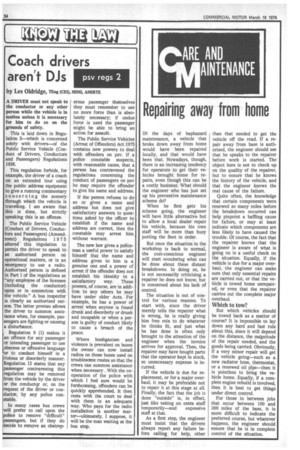Coach drivers
Page 56

If you've noticed an error in this article please click here to report it so we can fix it.
aren't DJs psv regs 2 by Les Oldridge, TEng (CET), MIMI, AIVIIRTE A DRIVER must not speak to the conductor or any other person while the vehicle is in motion unless it is necessary for him to do so on the grounds of safety.
This is laid down in Regulation 5—which is concerned solely with drivers—of the Public Service Vehicle (Conduct of Drivers, Conductors and Passengers) Regulations 1936.
This regulation forbids, for example, the driver of a coach on an extended tour using the public address equipment to give a running commentary concerning the scenery through which the vehicle is travelling. I am aware that this is done, but strictly speaking this is an offence.
The Public Service Vehicle (Conduct of Drivers, Conductors and Passengers) (Amendment) Regulations 1 9 7 5 altered this regulation to permit the driver to speak to an authorised person on operational matters, or in an emergency to use a radio. Authorised person is defined in Part 1 of the regulations as ,"any employee of the licensee (including the conductor) upon or in connection with the vehicle." A bus inspector is clearly an authorised person. The latter proviso allows the driver to summon assistance when, for example, passengers are fighting or causing a disturbance.
Regulation 9 (1) makes it lan offence for any passenger or intending passenger to use obscene or offensive language or to conduct himself in a riotous or disorderly manner. Regulation 12 states that any passenger contravening this regulation may he removed from the vehicle by the driver or the conduotor or, on the request of the driver or conductor, by any police constable.
In many cases bus crews will prefer to call upon the police to remove "difficult" passengers, but if they do decide to remove an obstrep erous passenger themselves they must remember to use no more force than is absolutely necessary; if undue force is used the passenger might be able to bring an action for assault.
The Public Service Vehicles (Arrest of Offenders) Act 1975 contains new powers to deal with offenders on psv. If a police constable suspects, with reasonable cause, that a person has contravened the regulations concerning the conduct of passengers on psv he may require the offender to give his name and address.
If the person refuses to do so or gives a name and address but does not give satisfactory answers to questions asked by the officer to establish if the name and address are correct, then the constable may arrest him without warrant.
The new law gives a policeman a useful power to satisfy himself that the name and address given to him is a genuine one and a power of arrest if the offender does not establish his identity in a satisfactory way. These powers, of course, are in addition to any others he may have under older Acts. For example, he has a power of arrest when anyone is found drunk and disorderly or drunk and incapable or when a person is guilty of conduct likely to cause a breach of the peace.
Where hooliganism and violence is prevalent on buses the owner can now install radios on those buses used on troublesome routes so that the crews can summon assistance when necessary . With the cooperation of the police with which I feel sure would be forthcoming, offenders can be quickly apprehended. It then rests with the court to deal with them in an adequate way. Who pays for the radio installation is another matter—ultimately, I suppose, it will be the man waiting at the bus stop.








































































































